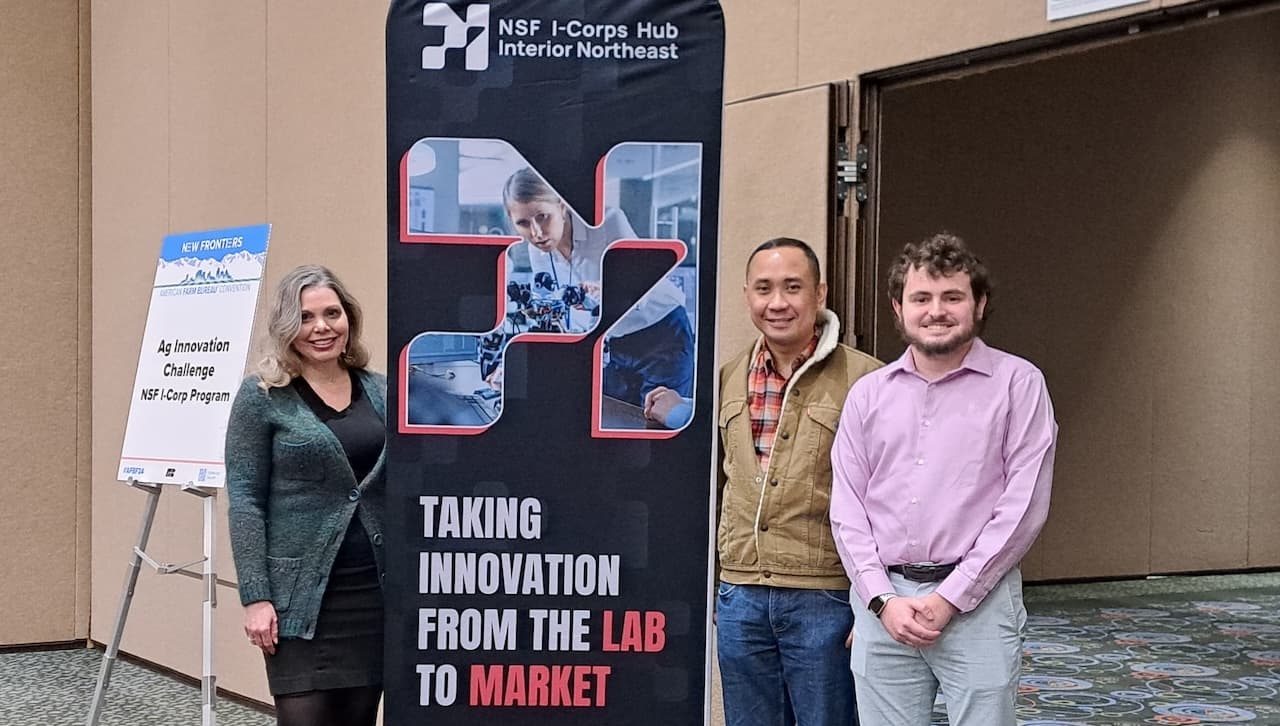Grant Supports Student/Faculty Product Innovation Research

A 2023 University of Scranton graduate and current graduate student and a chemistry professor received a National Science Foundation (NSF) Innovation Corps (I-Corps) grant to develop an analytical method to detect the authenticity of egg whites quickly and accurately.
Adam Mehall ’23, a chemistry graduate student from Scranton, will work to develop the application for the “Eggdicator,” an invention of Gerard Dumancas, Ph.D., associate professor of chemistry at The University of Scranton. Dr. Dumancas will serve as Mehall’s faculty mentor and principal investigator for the project.
Mehall will use combination of near infrared spectroscopy and chemometrics to detect the authenticity of egg whites to develop a reliable process that can be completed within two minutes for the Eggdicator device. The project received a $5,000 grant from NSF I-Corps Interior Northeast Region at Cornell University, which is aimed primarily towards customer discovery for projects recommended to move forward to the national I-Corps program.
The NSF I-Corps program is an immersive, entrepreneurial national training program that facilitates the process of taking innovations to the marketplace. Scranton falls in the NSF I-Corps Interior Northeast Region, which is hosted by Cornell University and spans the northern and eastern parts of Pennsylvania, as well as Vermont, New Hampshire, West Virginia and the northern region of New York.
The Interior Northeast I-Corps Hub “aims to expand the nation’s geography of innovation by developing a regional I-Corps innovation network that can become a repeatable, inclusive model of education and workforce training designed for and by innovators based in rural regions and small cities,” as stated on its webpage.
Mehall and Dr. Dumancas presented their Eggdicator technology at a recent NSF I-Corp Program “Innovation Challenge” event in Salt Lake City, Utah, in January 2024 at the American Farm Bureau Convention. The project is an inception of Dr. Dumancas’ 2023 University of Scranton faculty development intersession grant to research “A facile, convenient, and affordable method to determine the authenticity of liquid chicken egg whites”
A prolific research chemist, Dr. Dumancas was awarded more than $2.1 million in external research grants, including a five-year, $1.158 million National Science Foundation funded Noyce Scholars grant to support future STEM high school teachers in high-need school districts. In 2023, he received University’s Excellence in Integrating Diversity in Learning Award.
Dr. Dumancas has published nearly 100 research products in the form of journal articles, book chapters, books and intellectual property disclosures. His research focuses on the development of novel, faster and inexpensive analytical methods to detect adulteration of a wide array of food commodities including honey, turmeric oil, turmeric powder, coffee and egg whites. In doing so, his research group, which includes undergraduate and graduate students at Scranton, utilizes a wide array of machine learning and spectroscopic tools to develop robust multivariate calibration models for predicting adulteration in food products and other types of biological systems.
Just last year, Dr. Dumancas worked with The University of Scranton graduate students and published two original research articles in American Chemical Society (ACS) journals. He also published a digital primer titled “Spectroscopic and Chemometric Techniques for Pharmaceutical Applications” through ACS, and is the principal investigator for NSF funded project to develop a smartphone and spectrometry purity test for honey.
Dr. Dumancas joined the faculty at Scranton in the spring of 2022. He earned his bachelor’s degree in chemistry from the University of the Philippines and his Ph.D. in analytical chemistry from Oklahoma State University.






